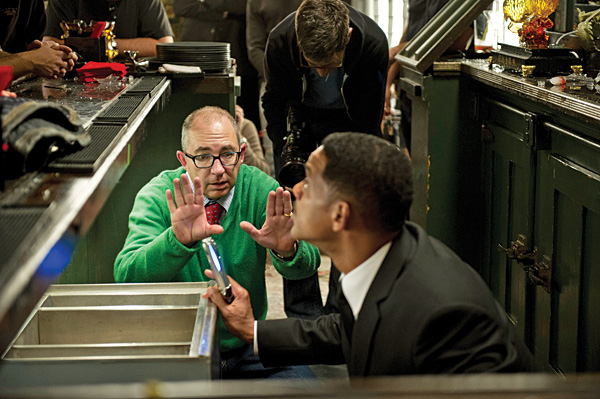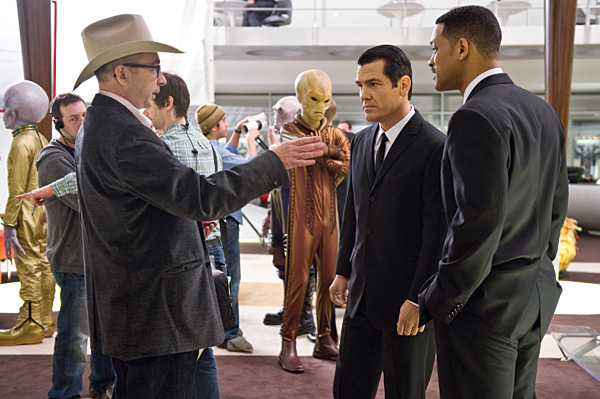Man in Hat: MIB director Barry Sonnenfeld Page 2
BS: I love the franchise. The first one and the third one were really good. The second one we tried to make too funny, and we didn’t have a great plot.
HT: MIB3 had an emotional ending, surprisingly.
BS: Totally Will’s idea, and it really makes the movie happen. I love the ending. And I loved Brolin.
HT: He was your choice?
BS: Yes, absolutely. The studio had a different actor in mind, and I fought very hard and convinced them to go with Brolin.
HT: Will there be an MIB4?
BS: I doubt it. It ended in a good way.
HT: You have a fascination with space. You even gave yourself a cameo in MIB3 watching the moon launch.
BS: I was 16 when that happened. I watched everything having to do with the astronauts, with the space program, from Mercury through Gemini and Apollo.
HT: You had an old Zenith clicker in MIB3! And you’re so into all the gear.
BS: Yeah. I drive Sweetie [Sonnenfeld’s wife] crazy because I’m a hoarder. I can’t throw anything away. Yesterday, I found a compact flash card that was 16 megabytes. That would take one photo frame right now.
HT: And remotes?

BS: [big smile] I’ve got every remote ever made. I just don’t throw them out. And I’ve tried practically every universal remote. I don’t think they’ve really come up with a great Control4 or Crestron-type system yet. There are so many layers of menus. Give me more buttons and knobs!
HT: Did you have a chance to walk around CES last January?
BS: I was out there briefly. Will Smith and I did an interview on the Sony stage to talk about 3D.
HT: Did anything jump out at you?
BS: Well, I saw this projector there. And I saw they’re finally coming out with bigger-screen OLEDs. They’re about to have 55-inch OLEDs. But sometimes to me it starts to look too super real. They can overdo it. Motion circuits will double the refresh rate, but it takes film and makes it look like video.
HT: You must have an impressive DVD and Blu-ray collection.
BS: Blu-ray is fantastic—and with this 4K projector, I can really see an even more dramatic difference between Blu-ray and DVD, so I’m starting to add to my Blu-ray collection. I have a 400-disc Blu-ray carousel, but I don’t use it because I’d rather not put all my movies in there and first have to turn on the screen to find the one I want. Somehow, you look up there, and you kind of don’t see it. I want a physical thing.
HT: Are we moving away from physical media?
BS: Not in Telluride.

HT: Well, that kind of answers the next question: Redbox or Netflix?
BS: Neither. I buy discs on Amazon Prime, so it’s shipped for free. I’m building up my Blu-ray collection because you cannot download anything here.
HT: But would you stream everything if you could? Or do you philosophically feel like you want the DVD or Blu-ray instead?
BS: Everyone talks about the cloud, but everyone creating cloud-computing lives in Cupertino, Redmond, or San Jose where they actually have high-speed Internet. The question about streaming is a theoretical one because, in Telluride, just this morning we had no Internet. I wouldn’t mind not having to own stuff, it just won’t work right now where I live. But you know, there is something about going like that [points to and scans an imaginary bookcase] and looking at the physical boxes.
HT: So what’s next?
BS: I’ve got several projects both big and small. I’m working with a famous comic book writer named Grant Morrison who reinvented the Batman franchise for the comic book world and is a superstar within the world of comic books. I came up with an idea—a bit wacky—called Dominion, but the subtitle is Dinosaurs Versus Aliens. This will probably be the most violent movie I do. There is another movie at Warner Bros. that involves a DC Comic character from decades ago. So that’s all I’ll say on that. Then I have several other smaller independent films.

HT: TV shows versus making a film?
BS: They’re different and equally rewarding. What’s great about working in television on something like Pushing Daisies is there’s a beginning, a middle, and an end—and that happens in three months. You read a script, you say, “Yeah, I’ll do this.” You have some meetings—you cast it, you shoot it, you edit it. There’s also the pace, both on the set making a show and then the pace of time from when you decide to do it until the time that ABC decides to air it. If they decide it’s not going to air, no one knows about it. No harm, no foul. You don’t spend two years of your life waiting for the Friday-night opening to discover you’re a horrible director and you’ve made a terrible movie. It’s much more anonymous in TV. But I like both.
HT: Your motto: Regret the past, fear the future, but never, ever live in the present.
BS: [laughs] It doesn’t give you any place to be, really. The great thing about Telluride is that it’s much easier to make the outside world go away. And because of the lack of Internet, and the constant electrical storms, you end up not really being able to be anywhere but here.





























































